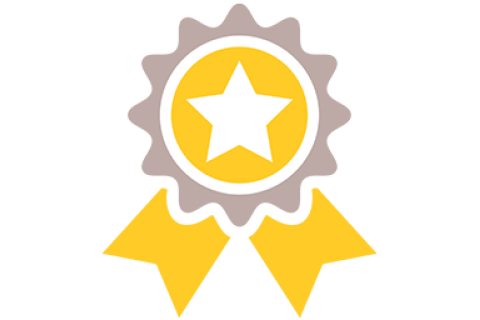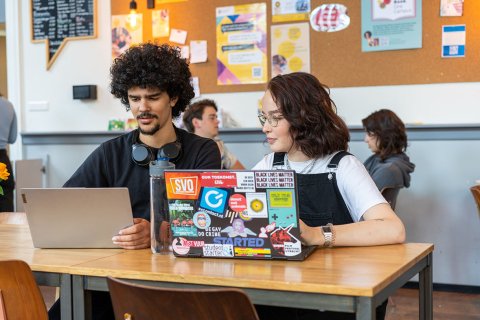Study programme
The Master's programme Cultural History and Heritage comprises one year (60 EC). A study year is divided into two semesters, running from September until January and from February until June. A semester is divided into two study periods.
Curriculum
In the first study period you will fill your cultural-historical toolbox with theories, methods and presentation forms. In the second study period you will choose three tutorials: you step in to the workshop of you lecturers and become acquainted with the state of the art of research. In study periods 3 and 4 you will work independently: you do an internship and write your thesis. You can check the study schedule (PDF).
Study period 1 | Compulsory courses
- Understanding Culture offers an in-depth overview of the most important theories in cultural history and offers you the theoretical perspectives that you will apply in the rest of your Master.
- Public History takes you beyond the Ivory Tower to explore how academic historians can work together with citizens and professionals from other cultural institutions to present the past.
- Sources and Methods is an introduction to the most important methods in cultural history and how to apply them to the sources. You will learn about discourse analysis, digital hermeneutics, visual analysis and material culture.
Study period 2 | Tutorials
In study period 2 you choose three tutorials. Tutorials are small-scale seminars (max. 12 students) in which you will conduct research within the expertise of your lecturers. You can choose from nine tutorials (five in English, four in Dutch), that deal with, for example, heritage in the 21st century, popular culture and citizenship, cultural environmental history, global cultural history and postcolonial memory. In one of these three tutorials you will start to work on your MA thesis.
Study period 3 and 4
The second part of your year is devoted to the internship and MA thesis. You will be supported in finding an internship and will also receive guidance from the programme during your internship. You will choose a topic within the expertise of your supervisor, to ensure you of the best possible supervision.
Part-time and language
Part-time students follow the same courses as full-time students. Their programme is spread out over two years. Our programme has a Dutch-language and an English-language Master. The modules of both Masters are the same, only the language is different.
Examples of thesis titles
- Letters from ‘een Vriendinne van de Waarheid’: Etta Palm d’Aelders, citizeness-ship and the public sphere, 1788-1798.
- Algeria, Decolonisation, and the British press 1954-1962.
- Slavery on Display: Propositions for the improvement of the representation of material slavery history in museums.
- Jewish Americans and the Holocaust. The Holocaust discourse in Jewish American newspapers, 1945 – 2000.
- Spaces of National Culture in Imperial Germany. Baedeker Guidebooks of the North, South and Rhineland, 1871-1914.
Thesis award

Cultural History alumn Louisa Niesen won the 2021 Faculty Thesis Award for her thesis 'Modern Women? On Practices and Experiences of "Modernity" in the Everyday Lives of Female White-Collar Employees in the Weimar Republic'. Read Louisa's testimonial.

Educational methods
- seminars (30%)
- group work (30%)
- self study (40%)
We use multiple forms of teaching: seminars, group work, self study and hands-on training such as the excursions and internships. Our teaching is activating: students participate and make the classes, together with their lecturers. We design our teaching in such a way that we expect our students to study, on average, 40 hours per week, including classes and excursions.
Internship
Our students found internship positions at the Nederlands Instituut voor Beeld en Geluid, Rijksdienst voor het Cultureel Erfgoed (in Dutch), Studio Louter, Centraal Museum in Utrecht, Wende Museum in Los Angeles and the Hiphop Archive and Research Institute (HARI) at Harvard University. Keep in mind that most organisations in the Netherlands use Dutch as their working language. However, you can also do an internship abroad, at a research project at a university or at an international organisation.
DOMcast

The UU Award for Exceptional Extracurricular Achievements 2020 was awarded to DOMcast, a group of students - including students of the MA Cultural History - who make podcasts about the personal history of a number of Utrecht residents. With their project, they have shown other students how inspiring and engaging research can be.
Examinations
- active participation in seminars and classes
- oral presentations
- short weekly written assignments
- longer essays
- internship report (including a sample of the results of the internship work)
- participation in the cultural career seminar
- thesis
Our examination forms are adjusted to the diversity of our programme. Apart from the well-known papers and presentations, we innovate our examination, for example to the new graduation trajectory.
Extra opportunities
For students looking for an extra challenge in addition to their Master's, there are several options. Utrecht University offers several honours programmes for students looking for an extra challenge. Honours education is followed on top of your regular Master's programme and goes beyond the regular curriculum. Honours programmes are available at interdisciplinary level and allow you to work on projects that transcend your own discipline.

